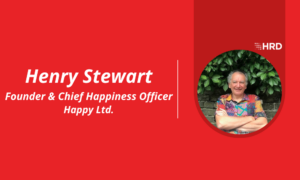Unlocking trust and autonomy across your organization
- 5 Min Read
Should the solution to a problem come first, or should the approval to act? According to Henry Stewart, founder and Chief Happiness Officer of London-based learning provider Happy Ltd., pre-approval might be the answer to faster innovation and growth.
- Author: Henry Stewart
- Date published: Mar 27, 2023
- Categories

Do your managers ask their people to come up with a solution to a problem or a new way of working and then require approval at the end? An alternative is the idea of pre-approval: approving something before they have found a solution.
Happy examples of pre-approval
At Happy, we had a 19-year-old in charge of our café, and she wanted to make it better, so we agreed on a budget and checked she understand the values of Happy and then we left her to decide how to make it better. I saw it for the first time when she had already created it. Imagine how that employee felt, three months into her first job, walking into her café. Absolutely proud.
Notice that we didn’t form a committee to look at it. We didn’t ask her to submit a report, and get others to feedback on it. We just let her do it. Have you ever been in a situation where you submitted something and people added their ideas, to the point where it no longer reflected what you wanted to achieve?
Another example was our website. In the past, I used to be very involved in the website. I would ask the website manager to add this or take this away, to the point where they felt they weren’t really in charge of the website. This time we decided to pre-approve it. That doesn’t mean giving people complete freedom. I have asked thousands of people which they prefer over “being told what to do”, “complete freedom” or “freedom within guidelines”. Very few people like to be told what to do. A few anarchists like complete freedom. However, most people like to have a framework and then have freedom within that.
We agreed on a set of brand guidelines before the project. We agreed on metrics, how many people visited, and how much income was generated. We sent Jonny on the best search engine optimization we could find. We insisted that Jonny talk to our customers. We didn’t need to know what they said, but we needed to know that he was not just using his own ideas but those of our clients.
I saw that website the night before it launched and I didn’t especially like it, but it was completely within the guidelines and so up it went.
When we got the metrics a couple of months later, visitors had tripled and income had doubled. (Even without the benefit of my expertise.)
HIPPOS
Google has a phrase, “Beware of HIPPOS”. It is not about swamp-based African animals but is about beware of the Highest Paid Person’s Opinion. Often the HIPPO is the person that people listen to, but often they are the person that is furthest from the front line, from those who talk to customers, and will often be the one least likely to have ideas that relate directly to the client.
In the book No Rules Rules, the Netflix story, there is an interesting piece about a woman called Jennifer Nierva. When she was previously at HP she came up with a $200,000 consultancy project. For a project of that value, she needed 20 levels of approval. It took her endless phone calls and six weeks of work.
When she came to Netflix she came up with a project requiring $1 million dollars. She asked her manager who she needed to get to approve it. He said “Nobody. If you are happy with it, just sign it off.”
As Netflix CEO Reed Hastings says: “At most companies, the boss is there to approve or block the decisions of employees. This is a surefire way to limit innovation and slow down growth. When the boss steps out of the role of ‘decision approver’, the entire business speeds up and innovation increases.”
Now you might think that a project of $1 million does need some sign-off, but the question is how to do it without limiting innovation and slowing down growth.
Trust and freedom
That is where pre-approval comes in. Instead of approving at the end of the project, work out all the guidelines that the person needs to understand. It will probably include a budget. It is likely to include who they need to talk to. It could include some regulatory or compliance issues. It may involve talking to customers. It could include branding.
In the early days of pre-approval at Happy, we would include all of those elements. However, as we have moved on, we don’t tend to need to do that. The key is that they are working within the company values. People now take real accountability and responsibility.
I have asked thousands of people when they have worked at their best. It is rarely about how well they were paid, it is only occasionally about how good communication was. Instead, for over 90% of people, in virtually every gathering I take part in, it is about being given the trust and freedom to make their own decisions.
Set up pre-approval throughout your organization and you will get the innovation and speeding up of the business that Reed Hasting talks about.
____
Henry Stewart is founder and Chief Happiness Officer of London-based learning provider Happy Ltd. Happy was rated one of the top 2 workplaces in the UK in 2022, and one of the top 15 in Europe (in the SME section). It now helps other organizations create happy workplaces. Feel free to contact him at [email protected]


